THE HURRICANE EXPRESS - SERIAL (1932) John Wayne & S. Grey | Action, Adventure, Crime | COLORIZED
The Hurricane Express is a 1932 American Pre-Code 12-chapter Mascot Pictures film serial. Written by Colbert Clark, Barney Sarecky, Wyndham Gittens, George Morgan, and J.P. McGowan, the serial was directed by Armand Schaeffer and J.P. McGowan and produced by Nat Levine. The Hurricane Express stars John Wayne as aircraft pilot Larry Baker. Wayne goes after a mystery villain named "The Wrecker", who was responsible for a train crash that killed Baker's father.
SYNOPSIS
When his father is killed in a train wreck, Larry Baker vows to unmask a mysterious criminal called "The Wrecker," who has targeted the L&M Railroad for deadly" accidents."
The L & R Railroad is in competition with an airline for lucrative transport contracts. When the "Hurricane Express" is sabotaged and involved in a train wreck, one of his victims is Larry Baker's father, Jim. A mysterious figure known as "the Wrecker" is responsible for the train crashes. Air Transport Company pilot Baker wants to find the Wrecker, but with a host of suspects, it will be difficult, since the murderer can disguise himself to look like almost anyone.
One of the main suspects in the train crashes is Walter Gray, the airline manager and Larry's boss, who stands to gain if the L & R Railroad loose contracts. Suspicion is also cast on Tom Jordan, a recently discharged and disgruntled railroad engineer. Another suspect is Frank Stratton, an escaped convict who had wrongfully been convicted. Complicating matters is that Gloria Stratton is Frank Stratton's daughter, and Larry is in love with her.
Gloria tries to help Larry find the villains behind the train crashes, and when the "Hurricane Express" is again ready to go back into service, the pair are in air, flying as an escort to the speeding train. With a full load of gold, the train is a tempting target for the Wrecker.
The continuing attacks on the L & R Railroad put Gloria and Larry in danger, but they are determined to bring the Wrecker and his gang to justice. Finally, the young pilot is able to capture the murderers and can to look forward to a happy future with Gloria.
CAST & CREW
Tully Marshall as Howard L. Edwards
Conway Tearle as Stevens
John Wayne as Larry Baker
Shirley Grey as Gloria Stratton
Edmund Breese as Frank Stratton
Lloyd Whitlock as Walter Gray
Al Bridge as Carlson
Matthew Betz as Tom Jordan
Joseph W. Girard as Detective Matthews
James P. Burtis as Detective Hemingway
Ernie Adams as Henchman Barney
Charles King as Mike, one of The Wrecker's henchmen
J. Farrell MacDonald as Jim Baker
Al Ferguson as Sandy, The Wrecker's pilot
Glenn Strange as Jim, one of The Wrecker's henchmen
Directed by Armand Schaeffer, J.P. McGowan
Written by Colbert Clark, Barney Sarecky, Wyndham Gittens, George Morgan, J.P. McGowan
Produced by Nat Levine
Distributed by Mascot Pictures
Release date August 1, 1932
Running time 12 chapters (227 min)
Country United States
Language English
Chapter titles
The Wrecker
Flying Pirates
The Masked Menace
Buried Alive
Danger Lights
Airport Mystery
Sealed Lips
Outside the Law
The Invisible Enemy
The Wrecker's Secret
Wings of Death
Unmasked
NOTES
During the 1930s, after starring in The Big Trail (1930), its subsequent commercial failure meant that Wayne was relegated to minor roles in A-pictures, or starring, with his name over the title, in many low-budget Poverty Row Westerns, mostly at Monogram Pictures and serials for Mascot Pictures Corporation, such as The Hurricane Express.
The Hurricane Express was cheaply staged and relied heavily on studio sets for interior sequences. Two elements, however, were critical, the use of a train and an aircraft. Airline pilot Larry Baker flies as the co-pilot on a Trans World Airlines Ford Trimotor. The aircraft flew from the Grand Central Airport in Glendale, California, a favorite locale for Hollywood films featuring aviation.
While the Ford Trimotor appears in the first two chapters, the Curtiss "Jenny" is used in an aircraft-to-train transfer (a favorite stunt in the 1920s was a transfer from aircraft to aircraft, or other moving vehicles). A Fokker Trimotor also appears.
Although concentrating on the aviation aspects of the production, aviation film historian James M. Farmer in Celluloid Wings: The Impact of Movies on Aviation (1984), characterized The Hurricane Express as a lightweight formula melodrama.
Like many other serials, after the conclusion of the serial, The Hurricane Express was re-edited into a feature film version which eliminated approximately two-thirds of the original serial footage. Almost no footage from the middle chapters of the serial were used.
#oldmovies #freemovies #action #adventure #crime #classicfilms #freemoviesonline #colorized #lostandfoundfilms
-
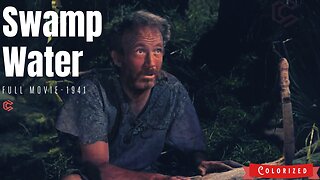 1:30:19
1:30:19
Colorized Cinema
1 year agoSwamp Water 1941 | Film Noir Crime | Colorized | Full Movie | Walter Brennan, Walter Huston
90 -
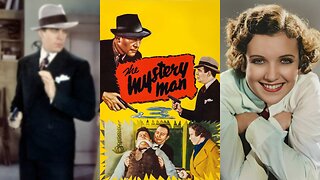 1:01:54
1:01:54
Lost n Found Films
6 months agoTHE MYSTERY MAN (1935) Robert Armstrong & Maxine Doyle | Action, Adventure, Crime | COLORIZED
74 -
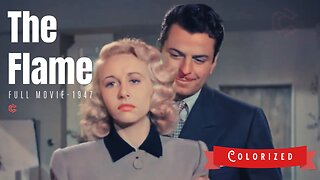 1:37:01
1:37:01
Colorized Cinema
1 year agoThe Flame 1947 | film noir, crime | Colorized | Full Movie | John Carroll, Vera Ralston
84 -
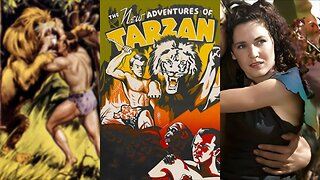 1:10:12
1:10:12
Lost n Found Films
6 months agoTHE NEW ADVENTURES OF TARZAN (1935) Bruce Bennett & Ula Holt | Action, Adventure, Crime | COLORIZED
148 -
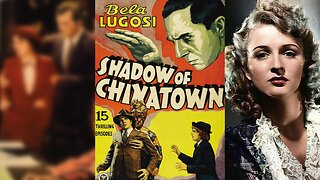 4:21:46
4:21:46
Lost n Found Films
5 months agoSHADOW OF CHINATOWN (1936) Bela Lugosi & Joan Barclay | Action, Adventure, Crime | COLORIZED
25 -
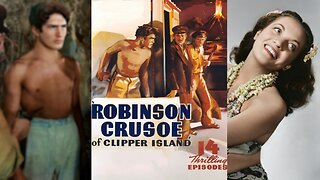 3:37:53
3:37:53
Lost n Found Films
5 months agoROBINSON CRUSOE OF CLIPPER ISLAND (1936) Mala & Mamo Clark | Action, Adventure, Crime | COLORIZED
79 -
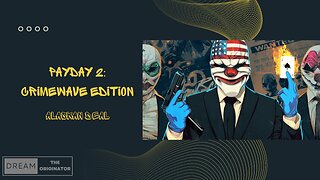 27:25
27:25
Dream The Originator
1 year agoPayday 2: Crimewave Edition (John Wick - The Alaskan Deal)
-
 48:59
48:59
Lost n Found Films
7 months agoINSIDE INFORMATION (1934) Rex Lease, Marion Schilling, Tarzan | Action, Adventure, Crime | COLORIZED
18 -
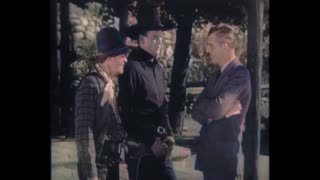 51:54
51:54
Public Domain Films and Songs
4 months agoWest of the Divide (Full movie in Color) John Wayne 1934
89 -
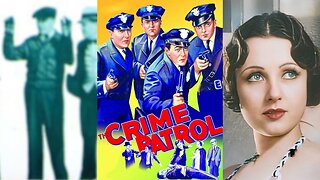 59:10
59:10
Lost n Found Films
4 months agoTHE CRIME PATROL (1936) Ray Walker, Geneva Mitchell & 'Snub' Pollard | Crime, Drama | COLORIZED
46